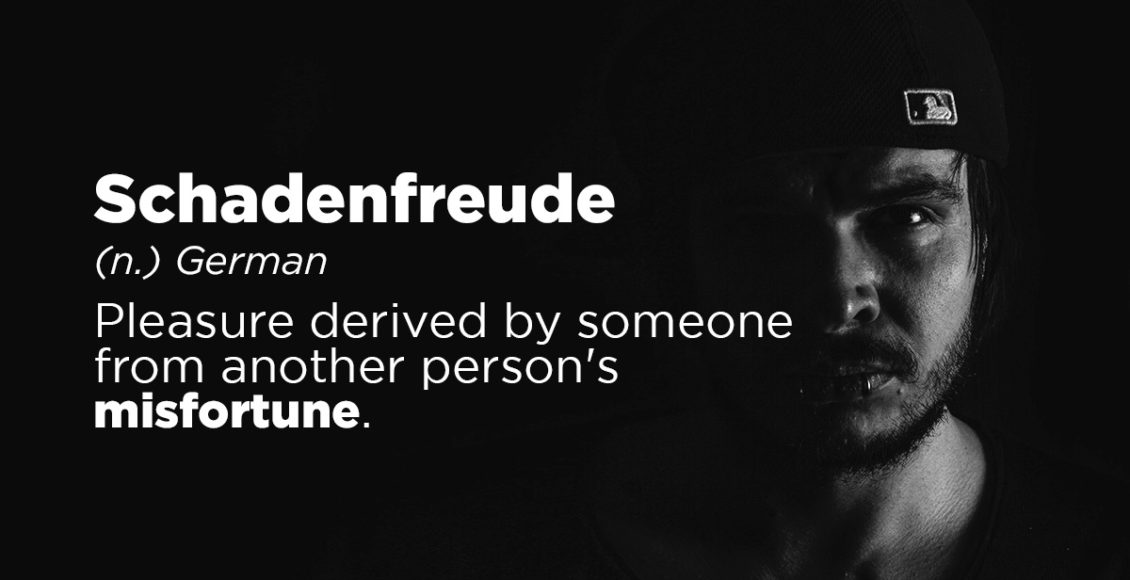Have you experienced joy out of the failure or disadvantageous position of another person- your peer, a celebrity, or someone personally close to you?
Schadenfreude is a German term, meaning quite literally “damage/harm-joy” which describes the feeling when one takes pleasure in the trouble or distress of others.
Psychologists at Emory University in the United States, have proposed in their review paper an innovative, recently developed “tripartite” model, exploring ‘Schadenfreude’ on the basis of one key idea. Namely, that deep-laid, survival instincts can drive us to perceive others as subhuman.
To start off, three distinct but interdependent subforms of the “Schadenfreude” emotion are to be acknowledged.
Those are the following: aggression, rivalry, and justice, each establishing a different concern on the matter. Additionally, it is argued by them that this emotion is deeply rooted in human development from as early as infancy and early childhood.
Aggression

Aggression fueled Schadenfreude comes forth as a result of the perception and awareness of social identity which begins to develop at the earliest stage- that of infancy. Protecting, as well as reinforcing one’s own social group in an evolutionary sense includes the involvement of ‘aggression schadenfreude’ towards the others or the ‘rivals’. For instance, this pattern is easily noticeable in the behavior of the supporters of rival football teams. Even when they are not playing against each other, one team’s supporters may take joy and pride if the other loses a match even against somebody else, for example.
Rivalry

The second subform is encompassing of “rivalry Schadenfreude” which is deemed to be rooted in social, person-to-person competition. That, in turn, describes the aspiration to be superior to one’s peers. Envy could definitely be contributory to this human reaction, as both appear to form at around the age of 7. Hence, self-evaluation is key to the issue of schadenfreude as those with lower self-esteem tend to be more prone to experience this emotion. This is due to the fact that people’s success can be considered threatening to the self-evaluations of individuals with lower levels of self-confidence.
Justice
The third form is based on the concept of justice, which marks its begin in early childhood as well. Put simply, it is when we experience joy due to the misfortune and failure of people we deem as deserving of such. For example, feeling content during the humiliating downfall of renowned people who have proven themselves to be frauds fall into this category.
However, people exhibit varying degrees when it comes to Schadenfreude, as the psychologists inform in their research paper.
Individuals who possess a ‘greater ranking’ in the so-called “dark triad” of narcissism, psychopathy Machiavellianism (which is a personality trait connected to the use of manipulation and exploitation of others in order to achieve one’s goals), have the tendency to experience schadenfreude more than others.
The aforementioned traits tend to be typically associated with viewing others as subhuman, or at least have the belief they lack some of the characteristics that deem us ‘human’.
As determined by the researchers, feeling schadenfreude could quite possibly be explained as going through “a [temporary] process similar to that experienced by individuals with high levels of psychopathic personality traits” much like when “the perceiver tends to dehumanise the victim” and is “temporarily losing the motivation to detect the victim’s mind”.
Dehumanization is understood to be potentially at the core of the emotion of Schadenfreude.
In conclusion, self-evaluation, in combination with social identity and the perception of justice are part of the “tripartite motivational model” which is said to fuel the experiencing of Schadenfreude. However, on the other side of the spectrum lies “mind perception” which enables the individual to possess the understanding of other people’s feelings and thought process (which pulls him/her away from Schadenfreude).
In order to motivate further research and clarity on the matter of Schadenfreude, the psychologist behind this specific research conclude the following:
“We encourage researchers to subject our theoretical model to rigorous tests so that they can be either falsified or corroborated, ideally with the aim of bringing this provisional model more closely in line with psychological reality… A deeper appreciation of Schadenfreude may provide a valuable window into the diverse origins of the darker side of humanity.“



